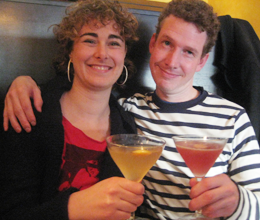We have just returned safely from a journey through Germany, Catalonia, and France. Needless to say, while such a trip acquaints you with the charms of foreign lands, it also highlights the merits of the place left behind, for which you find yourself feeling homesick. Although this blog is primarily about cocktails, I want to report on the state of a more basic staple of the human diet — beer — across these nations.
When the Tom Brokaw of thirty years hence sits down to mythologize the baby boomers as “the greatest generation” (a thesis sure to prove popular with members of that generation, at least), the improvements to American beer in the 90s and 00s will be some of the best evidence he’ll have to work with. I don’t know how my forebears made do with the limited domestic beer options of the old days, but I’m glad I don’t have to. Rather than facing a narrow choice between Budweiser, Miller, and Coors at most establishments, we 21st-century Americans can vary our choice between such excellent and widely available brews as Racer 5 and Red Tail, or any of the great Lagunitas ales, or many, many others.
In Germany*, there is no shortage of beers to choose from. On the contrary, the country seems to be based on the idea that you should be able to get and drink a beer any time and place you choose. I appreciate that. However, in our experience, the variety among different brands is surprisingly small. Most of the beers are light, refreshing lagers and pilsners. Never are they particularly hoppy. They are good, pleasant to drink after an afternoon of lugging a backpack around Fredrick the Great’s old digs, and I wouldn’t want readers to think that I’m implying otherwise. But there exists a much narrower range of flavor profiles to choose from than we are accustomed to. My comment at the time was that the many different beers “do not run the gamut, but rather run together.”
Our friend Spencer (who has spent considerable time living in Germany) has explained that whereas Americans like novelty, and so each brewer tries to produce something unique and different, Germans prefer pursuit of the ideal, perfect beer, and so all brewers aim to best realize this ideal. Thus they all produce similar brews. Whereas we can imagine the trajectory of American brewing as bouncing along on a graph and deviating more and more from average over time, the trajectory of German brewing would be doing the opposite: winnowing in every closer to sameness, approaching closer and closer to distribution along a straight line. We liked the Kristallweisses that we tried, and also the Schwartzbiers and Alts, but it wasn’t long before we were yearning for an Indian Pale Ale.
This mentality — the devotion to the One True Beer, and to rendering it incarnate unto the world — was in fact embodied in law in Germany for many centuries, in the Reinheitsgebot, or purity law. This was of a piece with the traditional Germanic passion for protectionism, and it died only because of European integration. Now it’s legal to import beer from anywhere into Germany, made from whatever ingredients you like, and the Germans take advantage of this freedom by importing beers that taste pretty much identical to what they were already producing.
The situation in Catalonia** was much worse. The Spanish beer that we tried was, to put it mildly, not impressive. The region seems to have no beer culture to speak of. As for imports, Heineken was the best thing available, by far. Oh well! They say the wine there is very good.
France*** has two domestic beers that are OK — 1664 and Pelforth — though they are not exciting. There are microbrews in France, but they have not reached a level of popularity such as would make them widely accessible. Luckily, you can also get Belgian beers, some of which are very good. Alarmingly, some French bars offer the option of getting fruity syrup in your beer for one euro more.
In short, this Fourth of July, we’re happy to celebrate the spirit of innovation and independence that characterize the local beer culture. Here’s to America the Brewful. Salut!
*The Germans incorrectly believe the country they live in to be called Deutschland.
**The Catalonians incorrectly think the place is called Catalunya.
***The French somehow get their country’s name right, though they soon go on to get other things wrong.










{ 2 comments… read them below or add one }
Jen, I loved getting Spencers take on why there is a lack of variety. I can see the Germans just trying and trying to get it right. I’m sure that there are connoisseurs from Germany that can give you great details as to why one lager is better than the other. Their taste buds are probably able to discern differences that I wouldn’t have a clue about. It’s funny that while in England that Ken and I would try and find a (first I asked for stronger beer but they thought I meant more alchohol) more flavorful beer and the one we liked the most was called IPA but it wasn’t as strong as our IPAs at all. Thanks for all your beer info. MR
Frankly, I’m now rather missing those German beers. They did have a certain sour, earthy quality that was complex and interesting. Somehow, even though Germany is an exporting country, we have more German-style American beers on the market here than we do German-made ones, and this in spite of the fact that imports from Belgium are available by the shelf at BevMo. World trade is a funny thing.